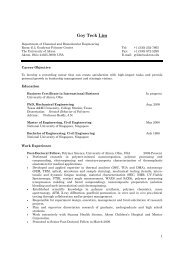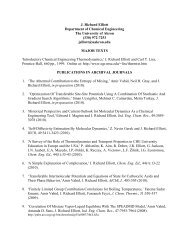Sociology of the Anarchists - Gozips.uakron.edu - The University of ...
Sociology of the Anarchists - Gozips.uakron.edu - The University of ...
Sociology of the Anarchists - Gozips.uakron.edu - The University of ...
You also want an ePaper? Increase the reach of your titles
YUMPU automatically turns print PDFs into web optimized ePapers that Google loves.
when teaching about gender.) I love <strong>the</strong> idea <strong>of</strong> comparing/contrasting <strong>the</strong> speakers'<br />
positions and forcing listeners to reconcile why we see some as more important than<br />
o<strong>the</strong>rs.<br />
Moulder (1997) confirms many <strong>of</strong> my apprehensions about how many things are taught—<br />
not just sociology—and how things are set-up beforehand for debilitating results for<br />
students. Whenever I open intro sociology texts, I find just <strong>the</strong> LAST chapter deals with<br />
“social movements and collective behavior”. While, I'm glad that <strong>the</strong> chapter exists and<br />
that it does make sense in a way for it to be at <strong>the</strong> end (“now that you know this, here's<br />
what people have and can do about it”).... I think that it still sets people up for depressing<br />
failure. How can we expect students to sit through nearly 14 weeks <strong>of</strong> “downer”<br />
sociology, and <strong>the</strong>n be picked up by one measly chapter at <strong>the</strong> end?<br />
I've been considering for <strong>the</strong> duration <strong>of</strong> this course to insert at <strong>the</strong> end <strong>of</strong> each lecture<br />
suggestions, ideas, antidotes, or webpages about movements and social change related to<br />
<strong>the</strong> topic discussed. I appreciate <strong>the</strong> focus upon exploring and learning <strong>the</strong> problems<br />
within society, but without providing a form <strong>of</strong> counter-expression or hope (as Moulder<br />
puts it) we guarantee depression, apathy, avoidance, or rejection.<br />
Also, I know a social work pr<strong>of</strong>essor at UA who commonly invites in local activists to<br />
her community organizing classes to discuss what <strong>the</strong>y do, why, how, etc. I've spoken in<br />
her class about half a dozen times, and my impression is that <strong>the</strong> students WANT to know<br />
how to do things locally that will have an impact about things <strong>the</strong>y care about. (And that<br />
such learning is just as valid as anything <strong>the</strong>y learn from textbooks.) I've been invited to<br />
present in “Intro to <strong>Sociology</strong>” classes on social movements, because teachers know I'm<br />
active and might have some personal impressions to contribute. Afterward I've been told<br />
that a teacher was very pleased and surprised that some students who had not spoken for<br />
nearly four months spoke up in class for <strong>the</strong> first time and were interested in <strong>the</strong> subject.<br />
It seemed to me that if we can find ways to make every lecture/class period more relevant<br />
and useful to students, <strong>the</strong> more <strong>the</strong>y'll want to learn and engage in class. From my own<br />
experiences in activist organizations, things start to stagnate—or people who are<br />
concerned about various issues move away from <strong>the</strong> group—when too much time is spent<br />
on complaining and debating <strong>the</strong> problems <strong>of</strong> an issue/society, and less time is spent in<br />
action. To counter this, I and o<strong>the</strong>rs have tried focusing discussion on particular problems<br />
(that are more “bite-sized”) and <strong>the</strong>n direct <strong>the</strong> group toward discussion about how to<br />
resist <strong>the</strong>se problems actively (and to create alternative, counter-actions that behave in<br />
ways more egalitarian, democratically, and liberating than <strong>the</strong> problems <strong>the</strong>mselves). In<br />
this respect, I liked Moulder’s suggestion for “action steps”.<br />
In many ways, my experiences in activist groups (particularly those with a radical<br />
focus/objective) have been <strong>the</strong> driving force toward sociology in my life. Activists <strong>of</strong>ten<br />
have a very equivalent interpretation <strong>of</strong> society that is shared by sociology as a discipline.<br />
And during <strong>the</strong> last 10 years <strong>of</strong> my life (much <strong>of</strong> which has been spent in or around<br />
colleges), I've been surprised that <strong>the</strong>re isn't a higher degree <strong>of</strong> participation in social<br />
movements by sociologists. It seems a very logical avenue for expressing dissent for<br />
those who have a very good understanding <strong>of</strong> what requires dissent. That said, I'm<br />
planning on speaking in Jean Anne (and Michelle's) intro classes later this semester; and<br />
[ Williams 100 ] [ this is a draft. do not cite. ]






